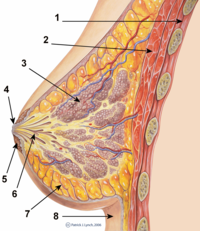
Photo from wikipedia
Kindlin-2, an integrin-interacting protein, regulates breast cancer progression. However, currently, no animal model to study the role of Kindlin-2 in the carcinogenesis of mammary gland is available. We established a… Click to show full abstract
Kindlin-2, an integrin-interacting protein, regulates breast cancer progression. However, currently, no animal model to study the role of Kindlin-2 in the carcinogenesis of mammary gland is available. We established a Kindlin-2 transgenic mouse model using a mammary gland-specific promoter, mammary tumor virus (MMTV) long terminal repeat (LTR). Kindlin-2 was overexpressed in the epithelial cells of the transgenic mice. The mammary gland ductal trees were found to grow faster in MMTV-Kindlin-2 transgenic mice than in control mice during puberty. Kindlin-2 promoted mammary gland growth as indicated by more numerous duct branches and larger lumens, and more alveoli were formed in the mammary glands during pregnancy under Kindlin-2 overexpression. Importantly, mammary gland-specific expression of Kindlin-2 induced tumor formation at the age of 55 weeks on average. Additionally, the levels of estrogen receptor and progesterone receptor were decreased, whereas human epidermal growth factor receptor 2 and β-catenin were upregulated in the Kindlin-2-induced mammary tumors. These findings demonstrated that Kindlin-2 induces mammary tumor formation via activation of the Wnt signaling pathway.
Journal Title: Science China Life Sciences
Year Published: 2018
Link to full text (if available)
Share on Social Media: Sign Up to like & get
recommendations!